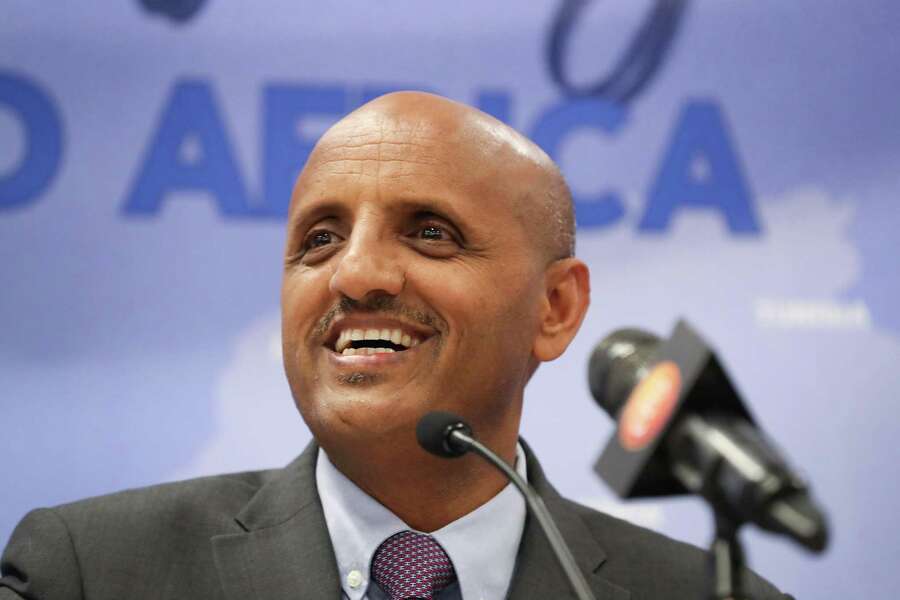Ethiopian Airlines’ inaugural flight to Houston,
landing Monday night with a water cannon salute, has revived an
important distinction for the city. Houston is once again connected to
every continent but Antarctica, an accolade lost in 2018 with the
cancellation of SonAir's charter flight to Luanda, Angola.
This
new flight, Ethiopian Airlines’ fifth nonstop destination in North
America, operates three times a week between Bush Intercontinental
Airport and Lome, Togo, in West Africa. Group CEO Tewolde GebreMariam
was in Houston to celebrate the plane’s arrival and to discuss the
airline’s growth and challenges in 2019.
Ethiopian Airlines CEO Tewolde GebreMariam
This year marked its new U.S. flight, an overall
increase in traffic and global recognition for the airline’s expansion.
But it also saw the crash of a Boeing 737 Max operating as Ethiopian
Airlines Flight 302. The airline had five Boeing 737 Max planes at the
time of the accident. Four have been grounded since.
GebreMariam, in an interview, spoke about these highs and lows.
Q: Why did Ethiopian Airlines begin flying to Houston? Who are you expecting as customers?
A: Houston, as we all know, is a very vibrant, fast-growing city. And it has a lot of activities in energy, health care and
other industrials. So business travel is our main focus. And second is
leisure. Houston is the largest concentration of Nigerians in the U.S.,
and a lot of Ethiopians and other Africans live here, too, so they will
be traveling to visit friends and relatives back home. And then the
other part of leisure is the American tourists visiting Africa. We are
targeting this segment and, of course, we have also American
missionaries and NGOs working in Africa.
And the route is justifying itself because the first flight was almost full coming into Houston. We are very bullish in our
forecast for the traffic. In a very short period of time, we will have a
daily service.
Q:
On March 10, the second Boeing 737 Max crashed. This crash was on
Ethiopian Airlines Flight 302. What was it like when you personally
heard the news?
A: It was very shocking. I was in church. And as soon as I heard about the accident, I went to the accident place. I took a helicopter to the accident. So it was shocking.
Q: What were some of the challenges associated with the crash?
A:
We were handling the victims’ families on one side and also running the
operation on the other side. We grounded the Boeing 737 Max planes
about 3 hours after the accident. These airplanes have been grounded
since then, and the grounding is being extended every month so we don’t know when the airplane is going to be back to service. It’s a big impact on our business.
On HoustonChronicle.com: Did Boeing, aviation industry heed lesssons 0f 2009 Air France crash?
Q: And how did you work with the victims’ families?
A: We were in close contact with the families. They were in more than 33 countries. We have a 5-star hotel in
Addis Ababa owned by Ethiopian Airlines, so we dedicated the hotel for a
month for those families coming from all over the world to comfort
them, attend to them, as they were going through the difficult
situation.
Q: Are you planning to fly the Boeing 737 Max again?
A: We will be reviewing the airplane’s safety after it is readyto go back into service, and then we will make a
decision. As soon as the FAA (Federal Aviation Administration) and other
regulators approve it, we will be doing our own assessment. It also
takes some time for us to convince our pilots, our crew and our
passengers because we had the accident. So we will be the last one. We
will not be the first one to fly the Boeing 737 Max.
Q:
Market intelligence firm CAPA - Centre for Aviation presented you the
Airline Executive of the Year award. How did that feel?
A: We are very happy that the
industry recognizes our effort and our successes. Today, we are the
largest airline in the continent of Africa. That growth has been very,
very fast in a short period of time.
Q: Can you elaborate on that growth?
A:
In 2010, we introduced our Vision 2025 where we had a 15-year strategy
for the airline. At that time, the airline was very small, No. 4 in
Africa, and nobody believed that we would achieve those numbers that we
put in our Vision 2025. Some media said it cannot be achieved from an
African airline operating in one of the most challenging operating
environments. That finance would be an issue,resources would be an issue, pilots, technicians, etc.
On HoustonChronicle.com: IAH to break ground on expanded international terminal
Q: What were those numbers?
A:
We aimed for 90 international destinations and 120 airplanes by 2025.
By 2018, seven years ahead of the scheduled achievement period, we had
already crossed 120 destinations. And the airplanes are already 130. So it was really a remarkable success and that’s why the industry is recognizing it.
Q: How have you continued this growth, and the airline’s positive image, following the Boeing 737 Max accident?
A:
The global brand of the airline is amazingly strong, especially in the
continent of Africa. So people knew right from Day 1 that this accident
doesn’t belong to Ethiopian. It’s just a matter of bad luck that the
accident happened to be with us, but it had nothing to do with the
airline. We had the accident on March 10, but in the monthof March itself our traffic grew by 10 percent from the previous year.
When we closed our financial year by June 2019, traffic grew by 17
percent. So this shows you that people and the traveling public have
strong confidence in the brand of the airline. We didn’t see any booking
cancellations or people doubting to travel on Ethiopian Airlines.

No comments:
Post a Comment